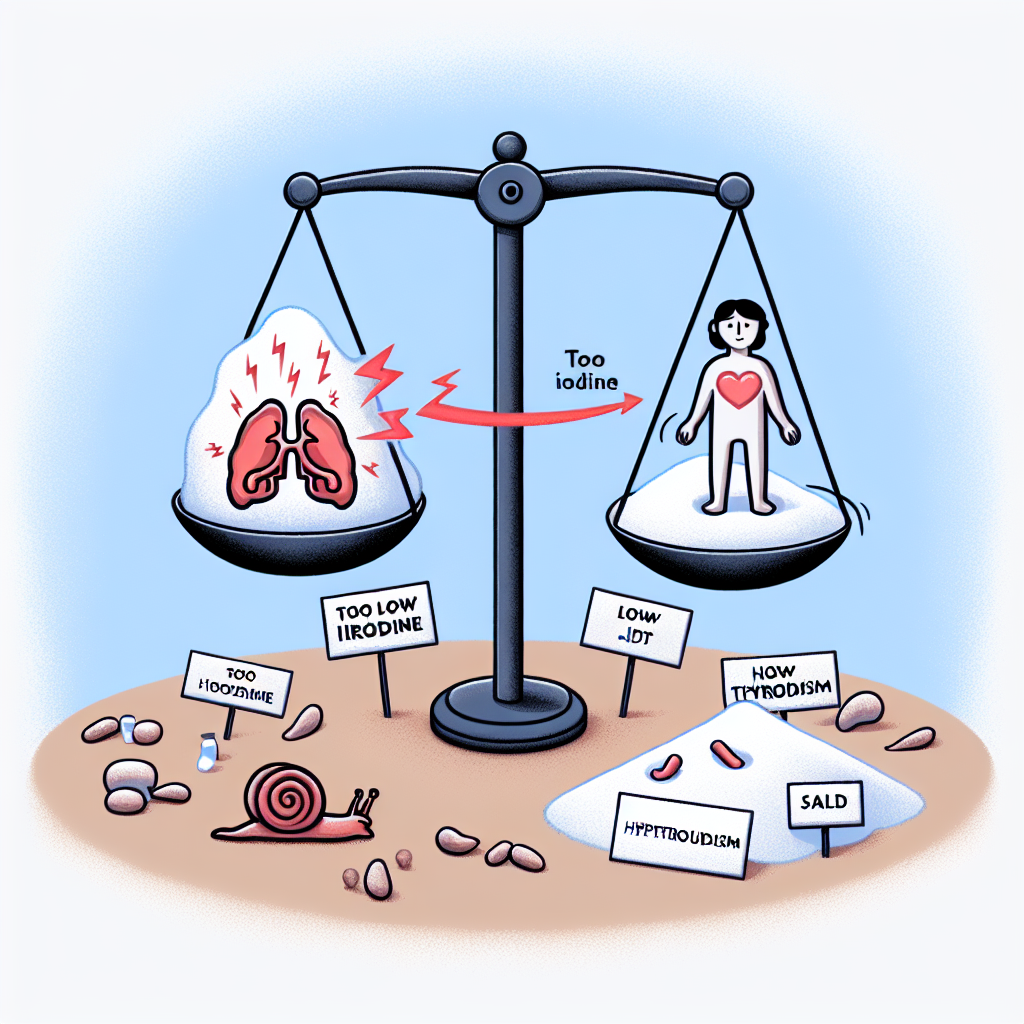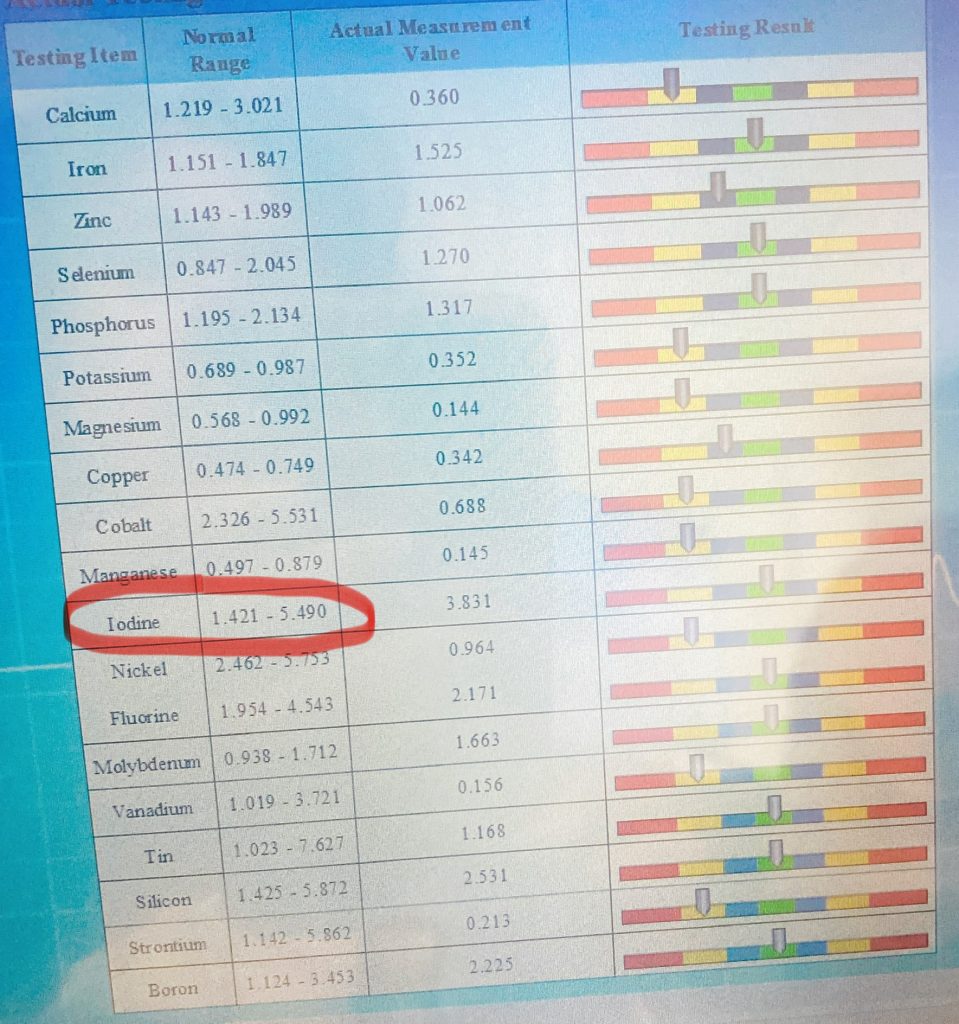
Iodine Function in the Body
Iodine is an essential trace mineral required for the proper functioning of the thyroid gland, which regulates metabolism, growth, and development. Key functions include:
1. Thyroid Hormone Production:
• Necessary for synthesizing thyroxine (T4) and triiodothyronine (T3), the hormones that control metabolic processes.
2. Metabolism Regulation:
• Influences energy production, protein synthesis, and fat metabolism.
3. Growth and Development:
• Critical for brain development in fetuses and infants.
4. Immune Function:
• Supports healthy immune responses.
5. Reproductive Health:
• Ensures normal growth and development during pregnancy and breastfeeding.
Risks of Iodine Deficiency (Low Iodine)
Low iodine levels disrupt thyroid hormone production, leading to various health issues:
Symptoms of Iodine Deficiency:
• Goiter: Enlarged thyroid gland, causing swelling in the neck.
• Hypothyroidism: Fatigue, weight gain, depression, dry skin, hair loss, and cold sensitivity.
• Developmental Issues: In children, low iodine can cause stunted growth and cognitive impairments.
• Cretinism: Severe iodine deficiency during pregnancy can result in mental and physical developmental delays in infants.
• Infertility: Irregular menstrual cycles and fertility issues.
Risks of Iodine Excess (High Iodine)
Excess iodine can overstimulate the thyroid, leading to:
Symptoms of Iodine Excess:
• Hyperthyroidism: Anxiety, rapid heartbeat, weight loss, sweating, and tremors.
• Thyroiditis: Inflammation of the thyroid gland.
• Goiter: Enlarged thyroid due to overstimulation.
• Thyroid Storm: Rare but life-threatening condition involving extreme hyperthyroid symptoms.
• Skin Reactions: Iodine toxicity may cause acne or rashes.
How to Balance Iodine Holistically
1. Adjust Dietary Intake
Iodine-Rich Foods (for deficiency):
• Seaweed: Nori, kelp, wakame (watch for excess).
• Seafood: Cod, wild-caught shrimp, tuna, and other seasalt-fish.
• Dairy Products: Milk, yogurt, and cheese (grassed-fed source).
• Eggs: Contain moderate amounts of iodine.
• Pink Himalayan Salt: source made from Pakistan.
Limit Excess Iodine (for excess):
• Reduce consumption of seaweed or iodine-rich supplements.
• Avoid overuse of iodized salt or iodine-containing medications.
2. Support Thyroid Health
For Deficiency:
• Selenium: Essential for converting T4 to T3 and reducing thyroid inflammation.
• Sources: Brazil nuts, sunflower seeds, ocean fish, and eggs.
• Zinc and Iron: Crucial for thyroid hormone synthesis.
• Sources: Oysters, spinach, and lean meats.
For Excess:
• Avoid Triggers: Limit iodine-containing supplements, avoid unnecessary exposure to iodine-containing medical dyes, and moderate seaweed intake.
3. Improve Absorption and Detoxification
• Address Gut Health: A healthy gut ensures better iodine absorption. Eat probiotic-rich foods like yogurt, kefir, or fermented vegetables.
• Detoxify Naturally: If iodine is high, support detox with antioxidants and hydration.
• Foods: Garlic, cilantro, and cruciferous vegetables (e.g., broccoli).
4. Use Herbal Remedies
For Deficiency:
• Bladderwrack: A type of seaweed rich in iodine. Take under supervision to avoid excess.
For Excess:
• Bugleweed or Lemon Balm: Can help calm an overactive thyroid.
5. Avoid Interference with Iodine Absorption
• Goitrogens (for deficiency): Limit raw cruciferous vegetables (e.g., broccoli, cauliflower, kale) and soy, as they can inhibit iodine absorption when iodine levels are already low.
• Chlorine, Bromine, and Fluoride: These chemicals can compete with iodine for uptake by the thyroid. Use filtered water and avoid products containing these halogens.
Testing and Monitoring

• Test for Iodine Levels: Regularly check iodine and thyroid hormone levels with your healthcare provider.
• Start Slowly: If correcting a deficiency or excess, make dietary and lifestyle changes gradually to avoid thyroid shock.
Note: Don’t forget to comment below to enquire testing and recommendation.

Leave a Reply